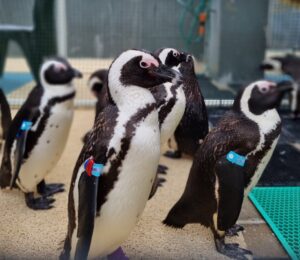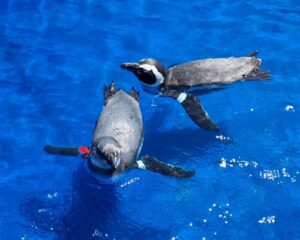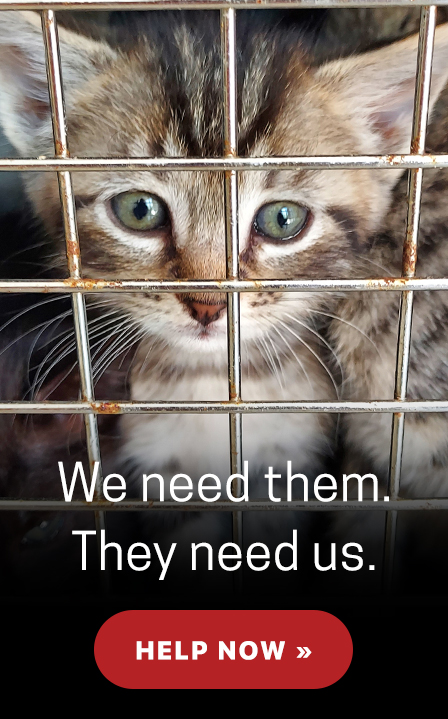WASHINGTON, DISTRICT OF COLUMBIA, April 1, 2024 — Global Humane, the international brand of American Humane, the United States’ first national humane organization and the world’s largest certifier of animal welfare practices, announced today that the Southern African Foundation for the Conservation of Coastal Birds (SANCCOB) Gqeberha Centre located in Eastern Cape, South Africa, has earned certification through the Global Humane Conservation™ program and is recognized for its high standards of care and treatment of animals.
“We are thrilled that SANCCOB Gqeberha has met the standards for the Global Humane Conservation certification,” said Dr. Robin Ganzert, President and CEO of Global Humane. “The work they do to reverse the decline of seabird populations, especially endangered species like the African penguin, is critical to conservation efforts and the long-term survival of species in the region.”
Rigorous Certification Standards:
To be recognized as Global Humane Certified, SANCCOB passed a rigorous independent assessment that reviewed the wellbeing of animals in their care and demonstrated overall excellence in their animal care and welfare practices. The unique process is guided by the latest science and best practices and is informed by respected veterinarians and experts in the fields of animal welfare, animal science, zoology, and ethics who have decades of experience in protecting animals.
The independent validation process—which goes above and beyond to help protect animals—provides visitors with confidence that the institution is meeting a high benchmark of care. The process includes submission of a pre-audit application, followed by an onsite audit that assesses animal welfare. Factors considered during the audit include, but are not limited to, housing, nutrition, water, lighting, shade, sound, activity levels, and the training of staff who are interacting with the animals. The benchmarks are species specific.
“SANCCOB Gqeberha is proud to have met Global Humane’s high standards for animal welfare. Through this certification, we will continue to provide the highest quality of veterinary and rehabilitative care to our seabird patients, continue to collaborate with internal and external stakeholders to achieve the best outcomes for seabirds and the habitat they rely on and to always be accountable, transparent, and to uphold our reputation to provide communication that can be trusted,” said Carl Havemann, SANCCOB Gqeberha Centre Manager.
The Global Humane Conservation™ program is the first certification effort solely dedicated to helping verify the welfare and humane treatment of animals living in zoos, aquariums, and conservation centers across the globe. The program enforces rigorous, science-based, and comprehensive criteria for animal welfare that are reviewed by an independent Scientific Advisory Committee comprised of world-renowned leaders in the fields of animal science, animal behavior, and animal ethics. The audit helps to verify excellent practices at deserving zoos and aquariums and offers increased assurance to visitors that the institution they are visiting is worthy of their support.
About The Southern African Foundation for the Conservation of Coastal Birds
The Southern African Foundation for the Conservation of Coastal Birds (SANCCOB) is a registered non-profit organization (NPO 003-134) with facilities based in Cape Town (Western Cape) and Gqeberha (Eastern Cape), South Africa. SANCCOB’s primary objective is to reverse the decline of seabird populations through the rescue, rehabilitation, and release of ill, injured, abandoned, and oiled seabirds – especially endangered species like the African penguin. The core of SANCCOB’s work has through the years evolved from being responsive to disaster situations (seabird oiling events) to expanding our conservation measures to boost the African penguin population through rehabilitation, research, preparedness and response, training, and education.
SANCCOB is internationally recognized as a leader in the field of seabird rehabilitation due to its commitment to providing the highest standard of veterinary care through purpose-built seabird hospitals and rehabilitation facilities in Cape Town and Gqeberha. SANCCOB admits an average of 2,000 seabirds per annum (excluding emergencies), and collaborates with conservation management authorities to rescue seabirds, including abandoned eggs and chicks from six colonies. Their rehabilitation efforts have resulted in an impressive release rate of approximately 75% for African penguins and 50% for other seabird species, successfully returning them to their natural habitat to bolster wild populations.
The African penguin population in southern Africa is dire. The causes are complex but include a lack of available food due to competition with commercial purse-seine fisheries, effects of climate change, predation and maritime associated risks including oil pollution and underwater noise disturbance. With the African penguin population declining at a rapid rate, and with around 9,900 breeding pairs left in the wild globally, it is imperative to act now to prevent a further decline of the species. Should no further effective management actions be implemented, scientists predict that the African penguin population faces extinction by 2035.
About Global Humane:
Global Humane is the international brand of American Humane, which is the United States’ first national humane organization and the world’s largest certifier of animal welfare, helping to verify the humane treatment of more than one billion animals across the globe each year. Founded in 1877, American Humane has been First to Serve™ the cause of animals and for over 145 years has been at the forefront of virtually every major advance in the humane movement. For more information or to support our lifesaving work, please visit www.AmericanHumane.org, follow us on Facebook, Twitter and Instagram and subscribe to our channel on YouTube for the latest breaking news and features about the animals with whom we share our Earth.



